
English_books / Adv_eng
.pdf
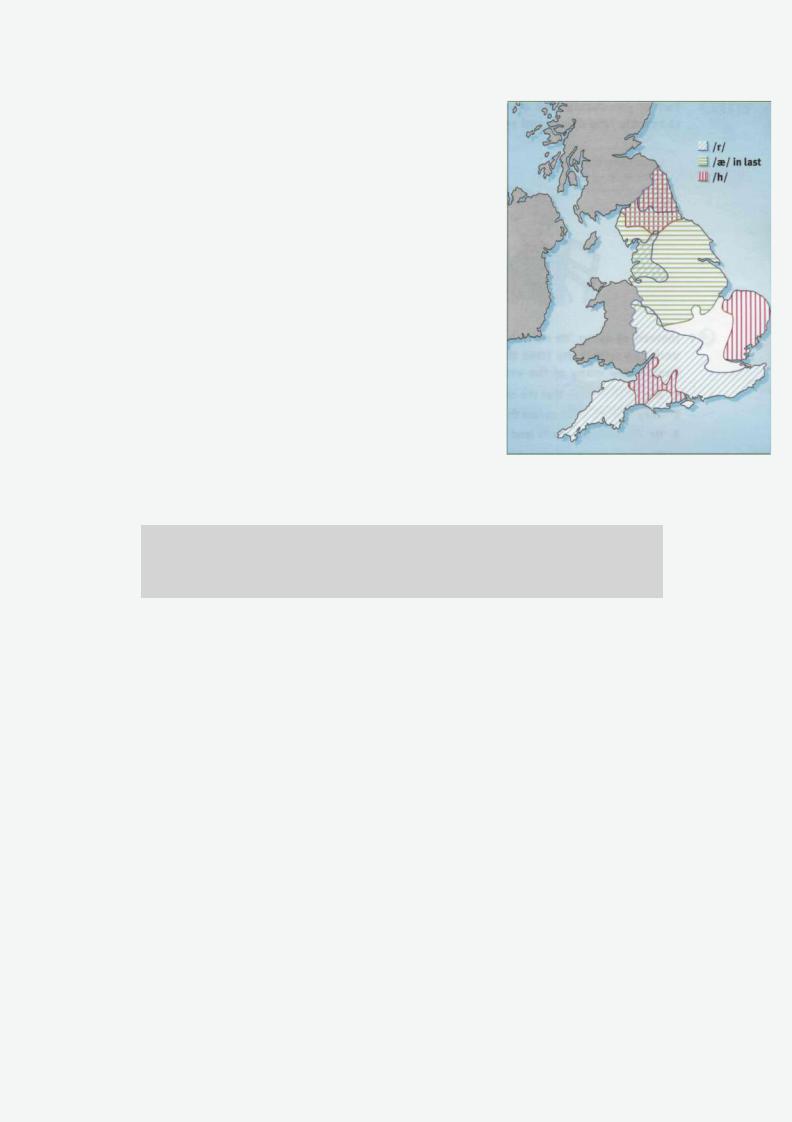
New Cambridge Advanced English
2Look at this map. Can you work out where the local people:
•pronounce the letter r in arm, farm, horse and flower
•don't pronounce the letter h in house, happy and hurry
•pronounce last, fast and castle with the same vowel sound as fat, cat and hat: /ae/
Discuss these questions:
•How many different national or regional accents of English can you recognise?
•How many different national or regional accents of your own language can you recognise?
•What are some of the differences in the spelling, vocabulary or grammar of different varieties of your own language?
14.2Indirect speech
Grammar
Although direct speech is often used like this in novels and stories:
"Shh! Be quiet!" she whispered urgently, "My husband's in the other room and he mustn't know you're here . . . "
- it's not used so much like this in everyday conversation or writing. It's generally easier to remember the CIST of a conversation than to remember the exact words. Moreover, the actual words may not always be terribly interesting:
"Hello," he said. "Hello,' I said. "How are you?" I asked. "I'm fine...fine/' he said. "Good," I said, "and...er...how's your wife?" I asked. "Oh, you know, same as ever," he said . . .
Discuss the differences in meaning between these sentences:
1He told us that he had visited Australia in the summer. He told us that he visited Australia in the summer.
He told us that he would be visiting Australia in the summer.
2She asked me if I had been to New Zealand. She asked me when I had been to New Zealand.
She asked me whether I had been to New Zealand.
3David says he wants to visit his relations in Canada. David said he wanted to visit his relations in Canada. David said he wants to visit his relations in Canada. David said, 'He wanted to visit his relations in Canada.'
4 Ruth phoned to say that she would be flying to India the next day. Ruth phoned to say that she would be flying to India tomorrow. Ruth phoned to say that she was flying to India the next day.
5 / didn't find out when the show starts. I didn't find out when the show started.
I didn't find out when the show will start.
I didn't find out when the show would start.
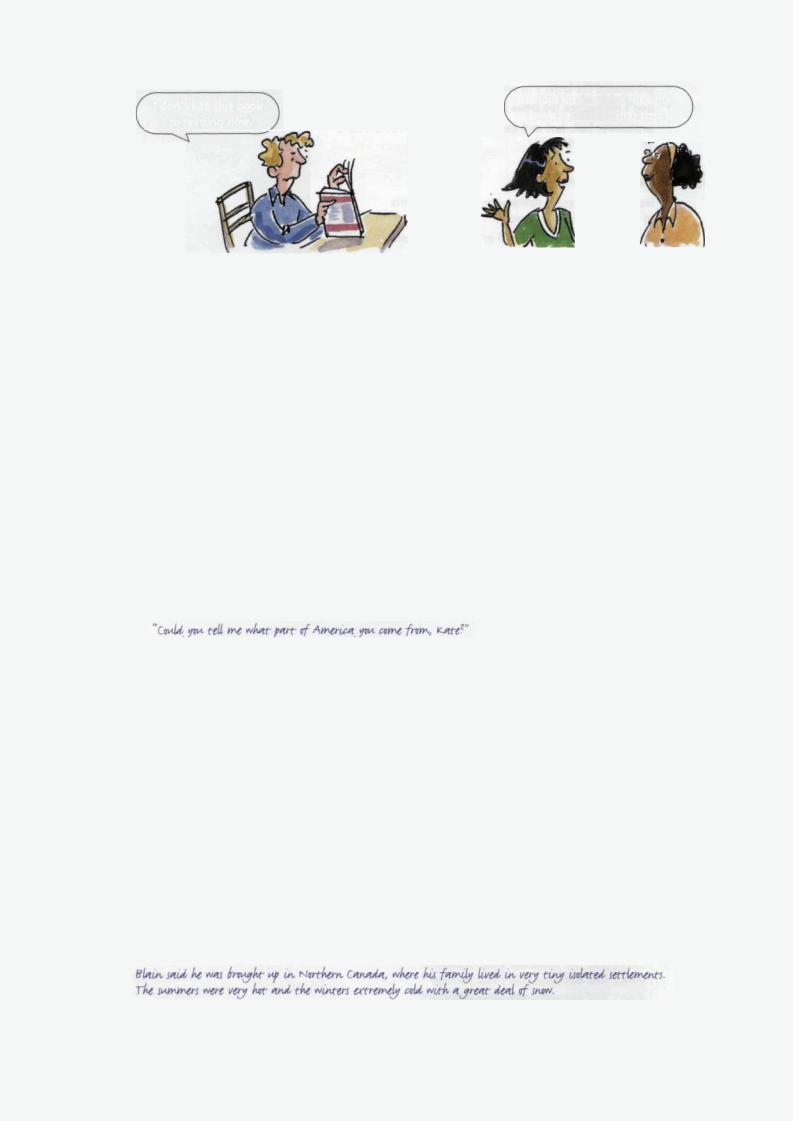
Two of you should look at Activity 7, the others at 26. You'll each have two short passages to rewrite into direct and reported speech.
|
|
He told me he didn't like that |
|
I don't like this book |
|||
|
book he was reading then. |
||
I'm reading now. |
|
||
|
|
1 Instead of using 'He said that. . .' or 'She asked if . . .' in reported speech, an appropriate verb can reflect the TONE that was used in direct speech and the FUNCTION of the sentence. Decide how many of the verbs below can be used to fill each of the gaps in these sentences:
1 |
She |
that she came from Australia. |
2 |
They |
us/me that they were feeling tired. |
3 |
He |
me to lend him some money. |
admit |
allow |
announce |
ask |
assure |
beg |
call out claim convince deny encourage |
||
explain |
inform |
insist |
instruct invite |
mention |
mumble |
notify order permit persuade |
||
repeat |
reply |
scream |
shout |
suggest |
tell |
urge |
warn |
whisper |
2Highlight the ten most useful verbs in CI that you don't already use. Then compose five sentences, each including one of the verbs you have chosen.
3Compare your sentences.
Each of these sentences gives a report of what various people said. Rewrite each report, using direct speech, giving the exact words you think each person might have used.
1 I tried to find out what part of America Kate came from.
2 Kate wanted me to guess, but in the end she revealed that she was from Toronto - in Canada! 3 Jane complimented me on my handwriting.
4 Jerry suggested that I should enrol for a course in Japanese.
5 Pippa insisted on paying for the whole meal, including the drinks.
6 Stephen encouraged me to go in for the exam and reassured me that I had a good chance of passing. 7 I warned Stephen not to be too confident as it was a long time since I'd last taken an exam.
8 Although they were strangers I asked the people in the corridor to stop talking so loudly as it was after midnight.
1You'll hear seven people talking about the places where they were brought up. Make notes as you listen. The speakers are:
1 |
Blain |
5 |
Nick |
2 |
Rupert |
6 |
Ken |
3 |
Cay |
7 |
Karen |
4 |
Enzo |
|
|
2 Write a short summary (two sentences only) giving the CIST of what each person said:
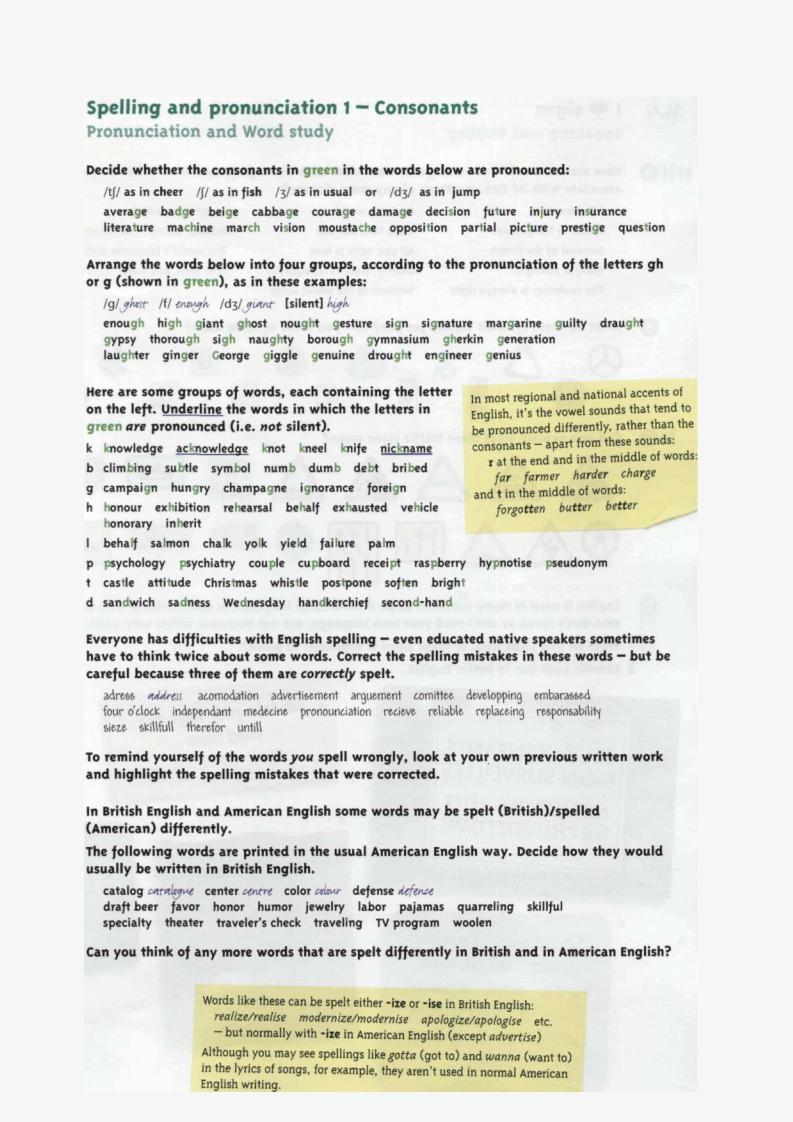
New Cambridge Advanced English
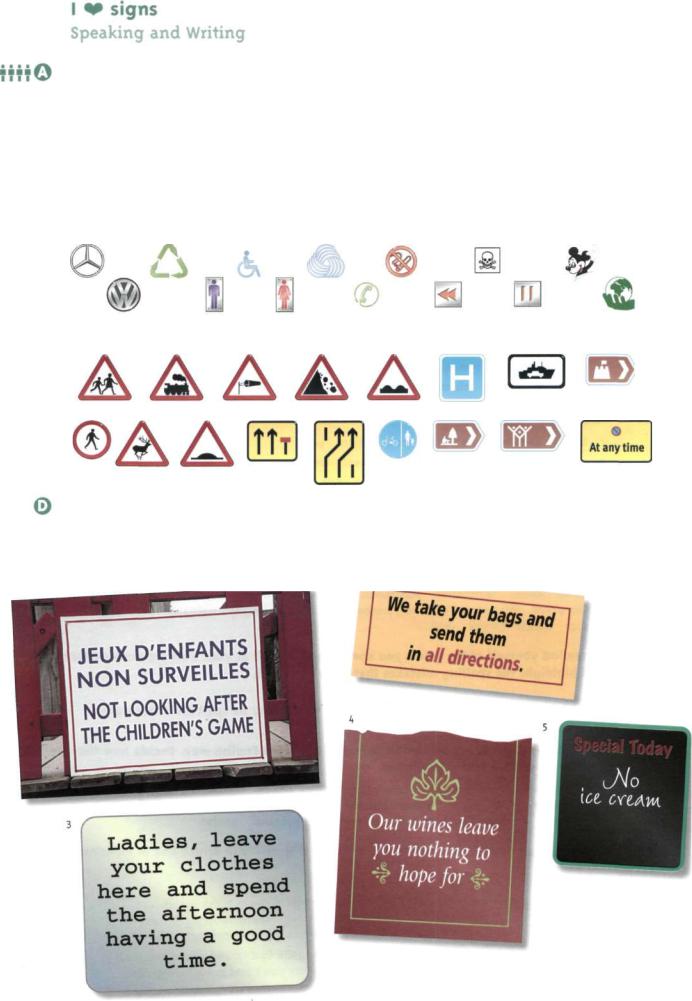
I love New York |
Feed the world |
Small is beautiful |
Power to the people |
Make love not war |
Nuclear power - no thanks |
Survival of the fittest |
All you need is love |
The world's favourite airline |
Unity is strength |
Liberty, fraternity, equality |
One man, one vote |
The customer is always right |
Workers of the world unite |
|
What do these symbols signify for you? Can you think of some more?
Can you explain what these traffic signs mean?
English is used in many countries as an international language to communicate with people who don't speak or can't read your own language. But not everyone writes very good English.
 What do you think each of these signs is supposed to mean?
What do you think each of these signs is supposed to mean?  Rewrite each one in better English.
Rewrite each one in better English.
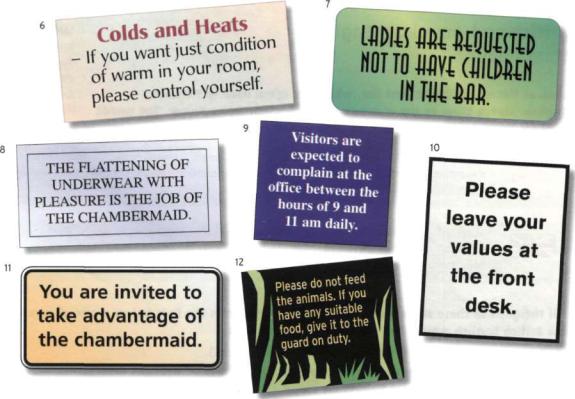
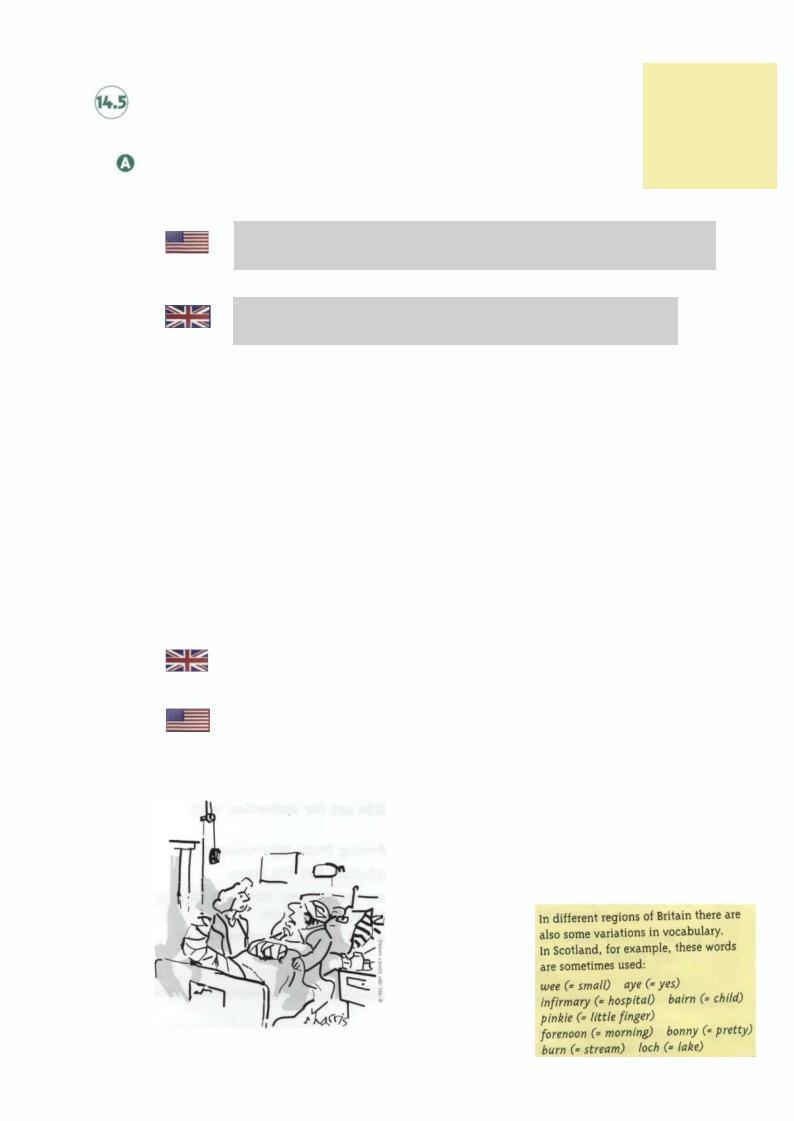
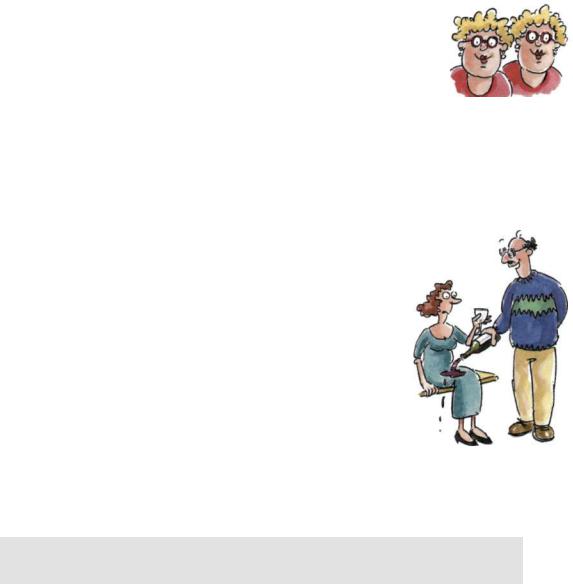
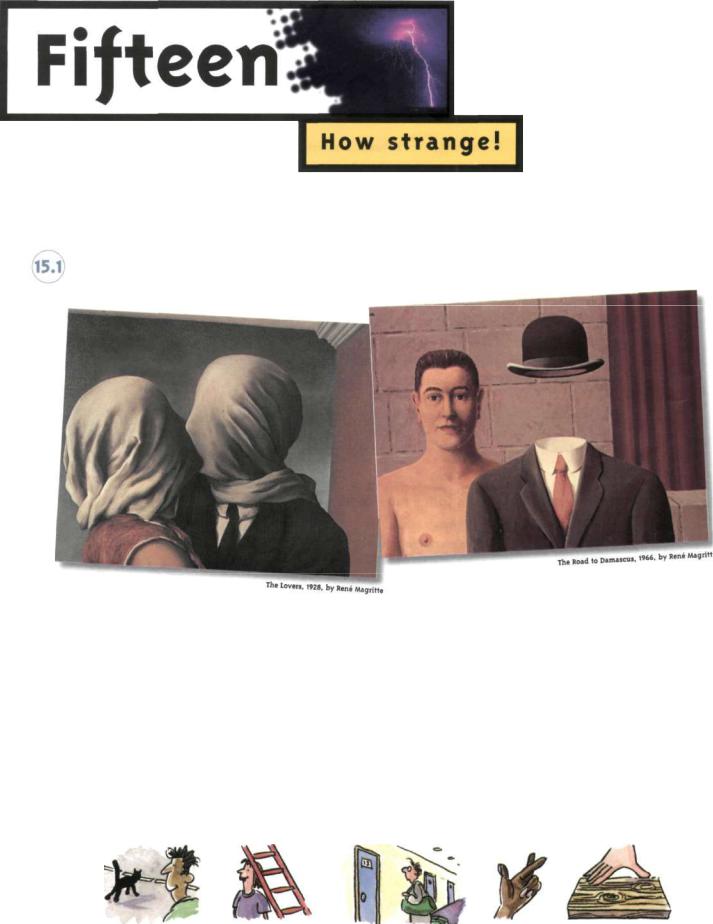
Truth or fiction
Speaking and Reading
1How would you describe the two pictures? How do they make you feel? Note down ten words that come into your mind in connection with them.
2You'll hear the first part of a story. What do you think happened next?
3Listen to the end of the story. Find out if you guessed right and then discuss your reactions to it with a partner.
Discuss these questions - and encourage your partners to expand on their answers:
•Do you believe in ghosts?
•What was the last coincidence that happened to you?
•Do you know anyone who seems to be accident-prone?
•If the only vacant rooms in a hotel were 7 and 13, which would you choose and why?
•Are any of the following believed to be lucky or unlucky in your country?
C Read the passage opposite and find the following information in the text:
1What do modern legends reflect?
2Apart from being retold by people, how are modern legends and tales disseminated widely?
3Find an example of one ancient legend and one modern legend.
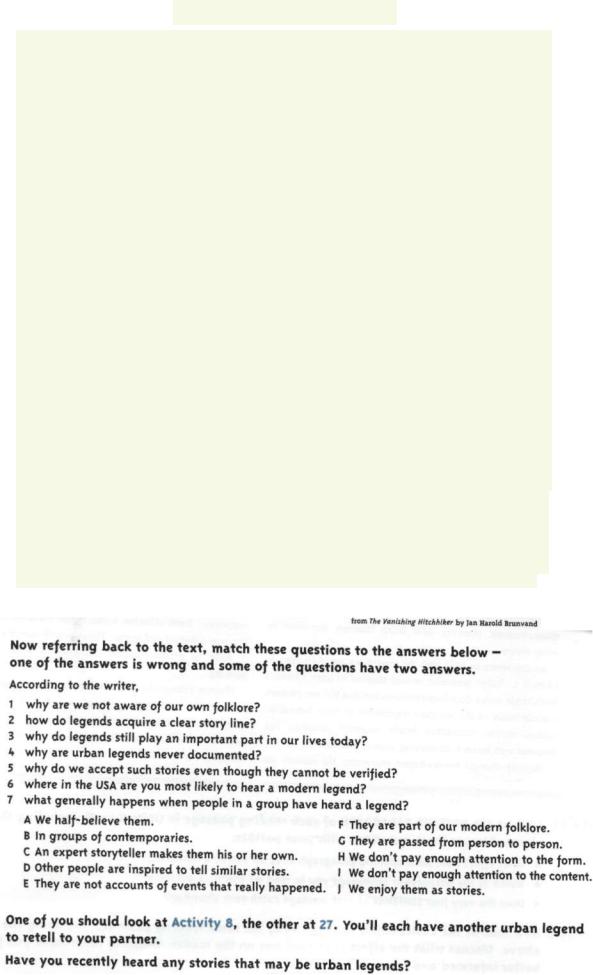
New Cambridge Advanced English
New Legends for Old
e are not aware of our own folklore any more than we are of the grammatical Wrules of our language. When we follow the ancient practice of informally transmitting "lore" - wisdom, knowledge, or accepted modes of behavior - by word of mouth and customary example from person to person, we do not concentrate
on the form or content of our folklore; instead, we simply listen to information that others tell us and then pass it on - more or less accurately - to other listeners. In this stream of unselfconscious oral tradition the information that acquires a clear story line is called narrative folklore, and those stories alleged to be true are legends. This, in broad summary, is the typical process of legend formation and transmission as it has existed from time immemorial and continues to operate today. It works about the same way whether the legendary plot concerns a dragon in a cave or a mouse in a Coke bottle.
It might seem unlikely that legends - urban legends at that - would continue to be created in an age of widespread literacy rapid mass communications, and restless travel. While our pioneer ancestors may have had to rely heavily on oral traditions to pass the news along about changing events and frontier dangers, surely we no longer need mere "folk" reports of what's happening, with all their tendencies to distort the facts. A moment's reflection, however, reminds us of the many weird, fascinating, but unverified rumors and tales that so frequently come to our ears - killers and madmen on the loose, shocking or funny personal experiences, unsafe manufactured products, and many other unexplained mysteries of daily life. Sometimes we encounter different oral versions of such stories, and on occasion we may read about similar events in newspapers or magazines; but seldom do we find, if even seek after, reliable documentation. The lack of verification in no way diminishes the appeal urban legends have for us. We enjoy them merely as stories, and we tend at least to half-believe them as possibly accurate reports. And the legends we tell, as with any folklore, reflect many of the hopes, fears, and anxieties of our time. In short, legends are definitely part of our modern folklore - legends which are as traditional, variable, and functional as those of time past.
Whatever the origins of urban legends, their dissemination is no mystery. The tales have traveled far and wide, and have been told and retold from person to person in the same manner that myths, fairy tales, or ballads spread in earlier cultures, with the important difference that today's legends are also disseminated by the mass media. Groups of age-mates, especially adolescents, are one important American legend channel, but other paths of transmission are among office workers and club members, as well as among religious, recreational, and regional groups. Some individuals make a point of learning every recent rumor or talk, and they can enliven any coffee break, party, or trip with the latest supposed "news". The telling of one story inspires other people to share what they have read or heard, and in a short time a lively exchange of details occurs and perhaps new variants are created.
